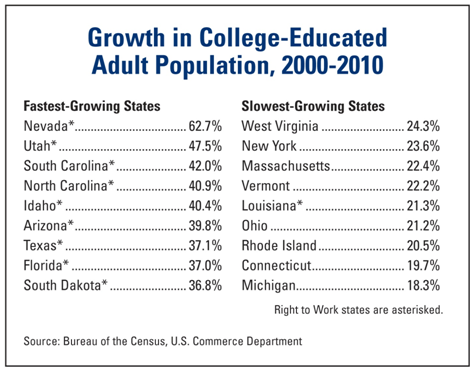For some states, the recession has been in the rearview mirror for a long time now. That’s certainly the case in North Dakota, where the unemployment rate is the lowest in the country at 3.4%. Oil and gas from the Bakken formation help, but as I’ve written, North Dakota ranks third in associate-degree-and-above educational attainment among 25- to 44-year-olds. It’s attractive to younger workers. Rounding out the top 10 after North Dakota are Nebraska (4.1%), South Dakota (4.3%), New Hampshire (5.2%), Vermont (5.3%), Iowa (5.7%), Wyoming (5.8%), Minnesota (5.9%), Oklahoma (6.1%), and Virginia (6.2%).
On the other end of the spectrum, where unemployment rates are the highest, it probably feels like the recession never ended. These states are Nevada (13%), California (11.3%), Rhode Island (10.5%), Mississippi (10.5%), North Carolina (10%), Illinois (10%), Florida (10%), South Carolina (9.9%), Georgia (9.9%), and Michigan (9.8%). Some of these states may quite possibly be stuck in a death spiral for years to come, but others will be able to rebound. There isn’t a magic bullet per se, but there are tools states can use that are like a flashing neon “Open for Business” sign. One tool is becoming a right-to-work state—meaning it’s illegal to force employees to join a union against their will.
Workers, like money, go where they’re well treated. College grads are moving to right-to-work states. The nine states with the greatest gains in college-educated adult population between 2000 and 2010 are listed below, courtesy of the November-December 2011 National Right to Work Committee Newsletter:

You can see in the table that South Carolina, Florida, North Carolina, and Nevada are among the nine states with the greatest gains in their college-educated adult populations and are right-to-work states. They are also among the states with the highest unemployment numbers that I discussed earlier.
But there’s a reason why Boeing set up its sophisticated 787 Dreamliner manufacturing facilities in South Carolina. Boeing recognizes that it needs workers who cannot be stifled by unions and can work freely to increase their merit-based wages. “The simple fact is, highly educated employees, like other employees, benefit from right-to-work laws,” says Matthew Leen, vice president of the National Right to Work Committee. “Employees of all kinds prefer to live in right-to-work states when they can because living costs are lower and real incomes are higher.”
There are two states that are in the group with the slowest growth in their college-educated adult population from 2000-2010 and the highest unemployment rates: Michigan and Rhode Island. The weak recovery may be self-perpetuating for the weakest states. In his Wall Street Journal piece “No Easy Balm for Joblessness Wounds,” Ben Casselman writes:
Unprecedented rates of long-term unemployment could threaten the economy’s recent gains. Some 5.6 million Americans have been out of work at least six months, 3.9 million of them for a year or more. Research shows that the longer people are unemployed, the less likely they are to find jobs. Economists aren’t sure why—to what degree it’s because workers’ skills deteriorate, or because they find ways to cope and give up looking for work, or whether the stigma of being unemployed for so long makes employers unlikely to hire them—but the effect is the same: Many of the people out of work the longest likely will never work again.
The risk, economists say, is that the U.S. will develop an underclass class of semipermanently unemployed workers, with severe consequences for productivity, public finances and even social stability. Europe, which faced a similar problem in the 1980s, is still dealing with the consequences.
States like South Carolina that are open for business and treat workers well will attract a mobile workforce. Those that are not attractive, like Rhode Island and Michigan, could be left with a non-mobile workforce, saddled with public debt and pension debt they didn’t spend or promise. How they pay it down when so many of the most productive workers have left has yet to be determined.
Related Posts:




 George Bush made 171 recess appointments, but they were all during actual congressional recesses. When Senate Democrats, including then-Senator Barack Obama, realized they could prevent President Bush from making appointments by keeping Congress in session through vacations, they seized on the chance. Bush, for once, abided by the Constitution’s mandate and did not make recess appointments during the pro forma sessions. President Obama has brashly, and perhaps illegally, made recess appointments during pro forma sessions of Congress. This is unprecedented no matter how much the liberal media tries to paper over it. (See
George Bush made 171 recess appointments, but they were all during actual congressional recesses. When Senate Democrats, including then-Senator Barack Obama, realized they could prevent President Bush from making appointments by keeping Congress in session through vacations, they seized on the chance. Bush, for once, abided by the Constitution’s mandate and did not make recess appointments during the pro forma sessions. President Obama has brashly, and perhaps illegally, made recess appointments during pro forma sessions of Congress. This is unprecedented no matter how much the liberal media tries to paper over it. (See 




